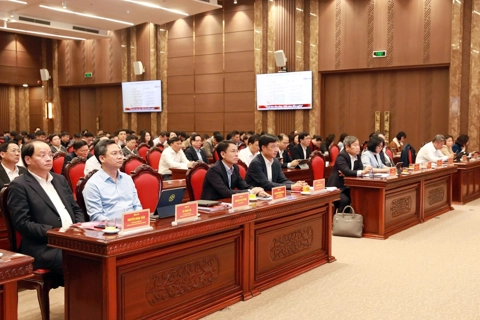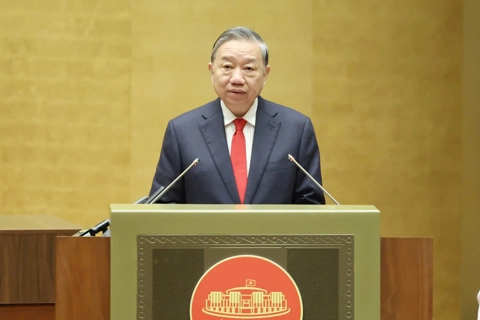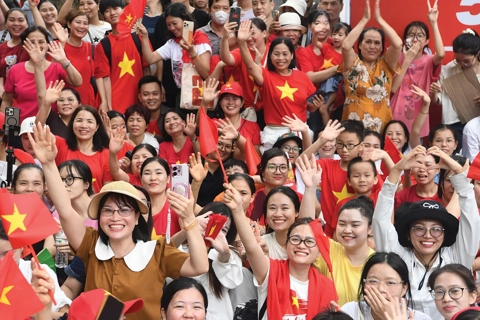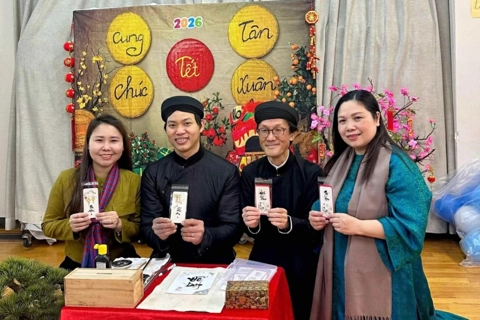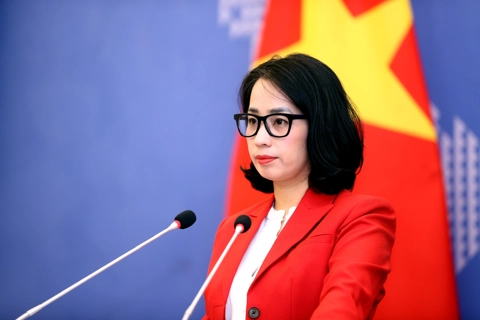Vietnam elected to UN Human Rights Council: Success doesn’t happen overnight
Vietnam is believed to win the election because of its contributions to the international community, efforts to protect human rights, and economic development.
Being elected to the UNHRC, Vietnam is the only candidate of the Association of Southeast Asian Nations (ASEAN) and the sole Asian candidate of the Francophonie, the French-speaking countries.
| Overview of the election for United Nations Human Rights Council members for the 2023-2025 term. Photo: UN |
The membership of the United Nations Human Rights Council (UNHRC) for 2023-2025, for the second time in history, has enabled Vietnam to contribute more to the world’s community and lifted its stature on international agendas.
The position it has earned is the result of the efforts and perseverance of the country whose wartime ended more than four decades ago.
Dr Nguyen Hong Hai, Honorary Research Fellow at the Center for Policy Futures, University of Queensland, Australia, attributed the election to three reasons: contributions to the international community, efforts for human rights protection, and economic development.
Hai said the stature that Vietnam has gained on the international agendas primarily resulted from its contributions, specifically demonstrated through the UN Peacekeeping Missions that Vietnam joined in 2014. The country’s peacekeeping deployment comes from its responsibilities but not merely obligations, gaining trust from the UN, partners, and countries with that the teams work.
Joining the UN Peacekeeping Missions shows Vietnam’s responsibility because it was a war victim seeking peace. It now contributes to building peace for countries that are victims of war.
In addition, Vietnam’s economic development has placed the country in a higher position in the international agendas, being one of the rising economies in Asia with people-centered development goals despite its poor economic growth in the past. According to the International Monetary Fund (IMF), Vietnam’s economic achievements lifted more than 40 million people or nearly half of the population, out of hunger in the 1993-2014 period.
Together with economic development, the Southeast Asian country has secured fundamental rights for its people by joining related treaties, Hai said.
"Vietnam was the first in Asia and second in Asia-Pacific to sign the United Nations Convention on the Rights of the Child, the Convention on the Elimination of all Forms of Discrimination Against Women (CEDAW), and the Convention on the Rights of Persons with Disabilities," Hai said.
In this regard, Vietnam’s national legal framework for protecting the rights of disadvantaged groups is complete and consistent with international standards.
Since the establishment of the UNHRC in 2006, Vietnam has actively contributed to this body’s operation, including being its member in the 2014-2016 term by joining the UNHRC Core Group on Human Rights & Climate Change, taking part in drafting some UN-adopted Resolutions on climate change impact on vulnerable groups, and co-authoring dozens of resolutions on economics, socio-culture, gender equality, anti-discrimination, unilateral embargo, international unity, among others.
Vietnam has also contributed and promoted cooperation and dialogue among countries towards the UNHRC’s balanced, progressive, people-oriented approach on different issues such as discrimination and violence against women, gender identity and sexual orientation.
Vietnam has promoted dialogues on the issues related to humanitarian aid to make sure it’s conducted on the principle of non-intervention and non-politicization.
Especially during the Covid-19 pandemic, Vietnam made efforts to ensure that no one was left behind with free-of-charge healthcare and vaccination, financial support, and stimulus packages for businesses.
Clear message
Vietnam’s Foreign Minister Bui Thanh Son, at the UNHRC’s 49th Regular Session held in March 2022, said: “We pledge to make positive contributions to the work of the Council in the spirit of ‘Mutual Respect. Dialogue and Cooperation. Ensuring All Human Rights, for All.”
Son said Vietnam would promote the enjoyment of human rights and fundamental freedoms in a comprehensive and holistic manner in all civil, political, economic, social, cultural, and developmental aspects. Meanwhile, the country will focus on protecting vulnerable groups and combating violence and discrimination against them, promoting gender equality, especially for women and girls in the era of digital transformation, as well as addressing global issues, especially climate change.
“We stand ready to work closely with other member states and stakeholders to uphold the principles of the UN Charter and international law and strengthen the efficiency of the Human Rights Council through dialogue, cooperation and mutual respect”, said the statement.
In July 2021, the UNHRC’s 47th Regular Session ratified a resolution on human rights and climate change submitted by Vietnam on behalf of the Core Group, including Bangladesh and the Philippines.
The resolution, with a focus on all persons in vulnerable situations, encourages the continued discussions among states and relevant stakeholders on the possible creation of a new Special Procedure addressing the adverse impact of climate change on the whole and effective enjoyment of human rights.
Regarding Vietnam’s contributions to the United Nations, Secretary-General António Guterres stated: “Vietnam is always a strong partner of the United Nations since joining the organization in 1977.” The armed forces play their part in the UN Peacekeeping Missions and Vietnam’s leading role in achieving the millennium Development Goals.
“Your vision and ambition of Sustainable Development Goals (SDGs) will be more important than ever as we recover from the Covid-19 pandemic,” he said on the occasion of the 45 years of the UN-Vietnam relations in 2022.
The Council, tasked with upholding and advancing human rights globally, consists of 47 member States, elected via secret ballot by the majority of General Assembly members.
The selection to the UNHRC for 2023-2025 is based on equitable geographical distribution, and seats are distributed among regional groups of States from Africa (13); Asia-Pacific (13); Eastern European (6); Latin American and Caribbean (8); and Western European and others (7).
The new members include Algeria, Bangladesh, Belgium, Chile, Costa Rica, Georgia, Germany, Kyrgyzstan, Maldives, Morocco, Romania, South Africa, Sudan, and Vietnam.


.jpg)




